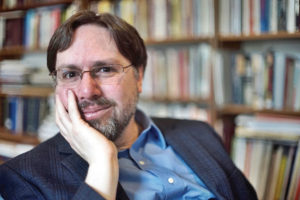Commentary on Parshat Beshalach (Exodus 13:17 – 17:16)
As the crowd surged in front of me, I felt completely out of my depth.
I had joined with members of my interfaith clergy group at a rally in the aftermath of a mass shooting. We were supposed to open the gathering with a blessing, but none of the hundreds of people there were paying us any attention.
“I have no idea what to do,” I admitted to my friend, Pastor Sheila. She winked at me as she stepped to the mic. “That’s easy,” she said. “They just need us to sing them together!”
As Sheila launched into “This Little Light of Mine,” I saw faces turning toward us. By the time she reached the end of the first verse, we were all singing together. The crowd wasn’t a random swelling – we were a wave, rocking and swaying in harmony.
In later years, I’ve always thought of this moment of unifying song when I read Parshat Beshalach, the Torah portion containing the Song of the Sea. When Miriam and Moses led the people in song, the Israelites became whole. In many ways, their first act of freedom was to sing together.
Sign up to receive Torah from T’ruah in your inbox each week.
This story is beloved to many Jewish communities. I’ve seen otherwise-quiet congregations rise to their feet and dance as they sing “Miriam’s Song,” Debbie Friedman’s account of how “the women, dancing with their timbrels, followed Miriam as she sang her song.” This year, an ancient question about this story strikes me with new relevance.
“But from where,” the rabbis asked, “could the Israelites have gotten timbrels and pipes with which to dance in the wilderness?” The answer is swiftly given:
Rather, these righteous ones were faithful and knew that God would perform miracles and do great things for them as they went forth from Egypt. So they prepared timbrels and pipes for themselves. (Mekhilta de-Rebbe Yishmael – Masechet Shirata 10 on Exodus 15:20)
The rabbis paint a picture of these women as being so hopeful in their future that they packed their musical instruments. They felt that their people would need to rejoice together. Even more, I imagine that our biblical ancestors knew that it would take a certain amount of time to get to where they were going. Perhaps they sensed a need not only to celebrate their deliverance from Egypt but also to keep their people unified and uplifted along the uncertain road to follow.
In a similar vein, most every social justice initiative in which I’ve been engaged has required planning, forethought and patience. Regretfully, I’ve also seen promising initiatives fail as those working on the projects were unable to offer the ongoing commitment, energy and focus that were required. With the American Psychological Association pointing to rising levels of stress and isolation, it’s a challenge for many to remain engaged in the work of tikkun olam.
Find more commentaries on Parshat Beshalach.
In a polarized and increasingly divided age, it can be easy to become discouraged and lose sight of our long-term goals. The wisdom of the women in this midrash reminds me that a sense of hope is an essential element in the great task of pursuing justice.
 This portion offers us a story of hopeful song and unity that can guide our work in the modern day. We all need a sense of uplift to persevere. This is a gift that anyone can offer; it’s a form of leadership that transcends speaking from a podium. However one is engaged in the work of tikkun olam, from working with an established group to ringing strangers’ doorbells, each of us can offer this gift to those whom we encounter.
This portion offers us a story of hopeful song and unity that can guide our work in the modern day. We all need a sense of uplift to persevere. This is a gift that anyone can offer; it’s a form of leadership that transcends speaking from a podium. However one is engaged in the work of tikkun olam, from working with an established group to ringing strangers’ doorbells, each of us can offer this gift to those whom we encounter.
Our songs can take many forms. Many people (like Pastor Sheila) love the songs of the Civil Rights Movement of the 1960s. Others are most inspired by the words from Jewish tradition. But I believe that song is not incidental to the work of social justice. Understood more broadly, we need to share moments of joy so that we can find hope and strength to continue our shared journey to a holy destination. Share your song freely – from any source that reaches you most fully.
As we sing this ancient song of deliverance together, let us inspire our communities in their work for social justice. In the words of Dr. Martin Luther King Jr., “When the slaves get together, that’s the beginning of getting out of slavery. Now let us maintain unity.”
Rabbi Josh Breindel became the rabbi of Congregation Beth El (Sudbury, MA) in July of 2018. He previously served for nine years as the rabbi of Temple Anshe Amunim (Pittsfield, MA). He was the president of the Pittsfield Area Council of Congregations for two terms where he worked to promote a vision of interfaith inclusivity and social justice for the Berkshires.

